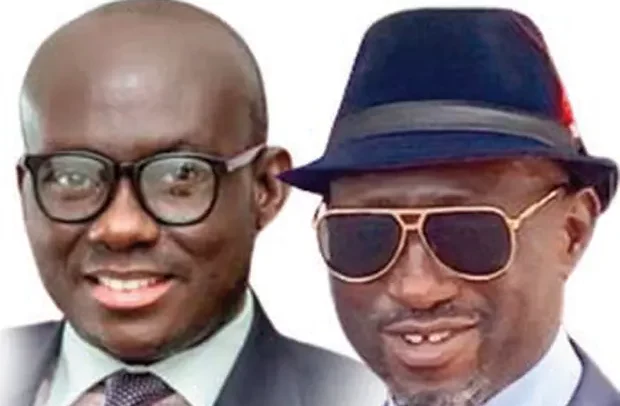Godfred Yeboah Dame and Richard Jakpa
The Attorney General and Minister for Justice, Godfred Yeboah Dame, has tendered in evidence documents proving that Richard Jakpa, the businessman in the €2.37 million ‘defective’ ambulance trial, was dismissed from the Ghana Armed Forces in 2007 on grounds of consistent fraudulent conduct, among others.
A copy of the dismissal letter which was admitted by the trial court states that Jakpa constantly failed his promotional examinations and had lagged behind his mates in rank, adding that his service within the army was “largely unsatisfactory, marked by consistent fraudulent conduct, abrasiveness and general indiscipline.”
The content of the dismissal documents sharply contradicts the accused person’s claim that he was released from the army because his services were no longer needed.
Jakpa’s Claims
While under cross-examination on June 18, 2024, the Director of Public Prosecutions, Yvonne Atakora Obuobisa had put it to Jakpa that he was dismissed from the Ghana Armed Forces in 2007 because he failed his examinations on five separate occasions, insubordination, misconduct and defiance.
The accused denied the assertion, claiming that he was victimised by the hierarchy of the military at the time, which was why he was released for services no longer needed.
He also claimed he was victimised by the senior officers of the Armed Forces because they were envious of his exceptional performance as a soldier.
Jakpa also told the court that even when he was transferred from Sunyani to Accra, the senior officers became hostile towards him because they felt he was an informant for the late President Jerry John Rawlings to spy on them.
Dismissal Letter
But the Attorney General last Thursday tendered in evidence a copy of a letter detailing the actual reasons why the businessman was dismissed from the army.
The letter signed by Brigadier General MKG Ahiaglo for the Chief of the Army Staff at the time, indicated that Jakpa was commissioned into the Armour Corps as a Regular Officer on August 21, 1998 and “all things being equal, the officer should have made the rank of Captain on August 21, 2002 and a Major on August 21, 2007.
The letter states that Mr. Jakpa consistently failed his ‘PROMEX’ (promotional examinations) and lagged behind his mates in rank.
“Also, his service with the Colours has been largely unsatisfactory, marked by consistent fraudulent conduct, abrasiveness and general indiscipline.”
The letter goes on to state that Jakpa was incessantly indebted to various people and institutions during the period.
“An example was his long indebtedness to Recce Regt PRI to the tune of $300.00, which he was unable to pay till authority was sought for the amount to be deducted from his salary.
“Throughout his service life, Lt R Jakpa (GH/2899) has proved consistently that he belongs to a world incompatible with the decent and gentlemanly composure that the Presidential Commission confers on officers of the Ghana Armed Forces,” the letter pointed out.
It continues that Mr. Jakpa is a bad example by all standards and his continued retention in the Service was likely to cause more harm to the Service and to himself.
“Indeed, in May 2004, a special report submitted on him by his Commanding Officer suggested that the officer had reached his ceiling.
Three years on, his new Commanding Officer describes his conduct as shameful and regrettable,” the dismissal letter noted.
It therefore, concluded that “From the foregoing the continued retention of Lt R Jakpa is not in the best interest of the Ghana Armed Forces and, indeed, himself. It has accordingly been decided that Lt R Jakpa be released from the Service forthwith.”
“I am therefore directed to request that Lt R Jakpa be released from the Service for inefficiency under Article 15 Item 2 (a) (through continued lack of application or interest) and Item (2) (c) (unsatisfactory conduct) of the Armed Forces Regulations
Volume 1 (Admin),” it added.
Fierce Objection
Earlier, the tendering of the letters saw a fierce objection from Thaddeus Sory, counsel for Mr. Jakpa as well as Dr. Abdul Bassit Aziz Bamba, counsel for Ato Forson.
Mr. Sory had argued that the accused was not given the opportunity to identify and associate with the documents the Attorney General had sought to tender into evidence.
He also objected to the tendering of the cover letter addressed to the Attorney General through the witness, adding that the accused was not copied hence could not speak to its content.
Mr. Sory referred to Section 60 of the Evidence Act which deals with personal knowledge and argued that his client was not even given the benefit of identifying, let alone associating with these documents.
Counsel further averred that no background was laid in respect of the letters to justify the tendering of those two letters through the accused, especially when he had denied knowledge of those letters.
Dr. Bamba associated himself with Mr. Sory and urged the court not to allow the documents in evidence, especially through the accused person.
Deputy AG Opposes
Deputy Attorney General, Alfred Tuah-Yeboah opposed the objection and argued that both defence counsel had conceded that part of the document to be tendered are related to Mr. Jakpa.
He said all the three documents are related to the accused and form part of his release from the Armed Forces.
“These other documents are relevant, and there is already evidence of the character of the accused person, and this document will help the court in making a determination,” Mr. Tuah-Yeboah argued.
Admitted
Justice Afia Serwah Asare-Botwe, the presiding judge, admitted the documents on grounds that they were official documents and the fact that Jakpa himself had earlier acknowledged the document when it was shown to him and said he could speak to them.
Mr. Jakpa was then made to read the content of the letter to the hearing of everyone in the courtroom.
He later claimed it was a doctored document and he had never seen it before.
BY Gibril Abdul Razak


